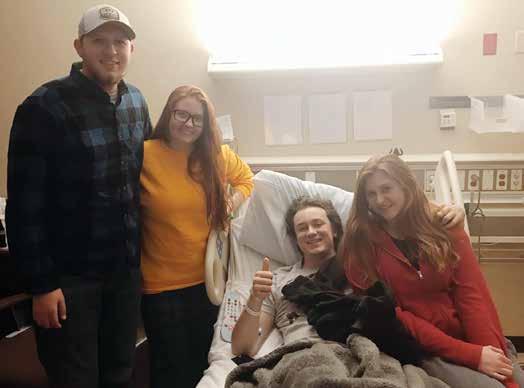
4 minute read
Park's Social Media Makes Life-Saving Connection

Lindsey Edwards, Park University admissions counselor (left), and Ally Braymer, senior nursing major Park’s Social Media Makes Life-Saving Connection
Lindsey Edwards, Park University admissions counselor, remembers “flipping through Twitter” last August when she saw a post retweeted by the University with a headline that caught her attention — My boyfriend needs a kidney. Blood type is A+.
Advertisement
"I knew from donating blood that my type was A+," said Edwards, who jotted the University of Kansas transplant donation line in the post on a sticky note and casually placed it on her computer monitor. "I looked at it for a couple of days and thought maybe I should do this."

A few days prior, Ally Braymer, senior nursing major, messaged Park to ask if the University would share her post to help Gavin Finch, her boyfriend since 2013 and friend since sixth grade, find a kidney. Diagnosed with IgA nephropathy (also known as Berger’s disease), an autoimmune disease that attacks the kidneys, Finch needed dialysis three times a week to stay alive.
“I sent that tweet the day we found out Gavin’s potential match wasn’t going to work out,” Braymer said. “I wasn’t sure if Park would retweet something like this. Looking back, I couldn’t have known what an incredible impact Park’s help would have.”
The right reasons
Beyond her matching blood type, Edwards discovered the many hurdles to clear to become a donor. “The first step was easy: I received equipment to monitor my blood pressure twice a day for a week. The next step was super awkward,” she laughed. “I had to collect urine samples for a 24-hour period.” To stay on schedule, she did it on a work day. “I brought the collection equipment in a cooler to the office. I hoped for the best that no one would ask.”
In fact, Edwards told no one about her decision to pursue the kidney donor evaluation process other than her husband, Jake. “I didn’t want to spread false hope,” she said.
In addition to a full workup of X-rays, scans and bloodwork, Edwards attended a workshop where every risk was presented. The final step was a psychological assessment. “They want to know you can handle the surgery emotionally and are doing it for the right reasons,” she said.
Test results showed Edwards was a 94 percent match for Finch, which is high for people who are not family members. When she decided to share her decision to donate her kidney, Edwards faced the questions she expected from family and friends — “You don’t even know this person. Why are you doing this?”
“When we hear about something like Gavin’s situation, we hope somebody will help them. Sometimes, it’s your turn to step up,” Edwards said. “I felt called to do this and I needed to know: Am I the one? This time it was me.”
Edwards reflected on the message she sent on Oct. 3, 2018, to introduce herself to Finch and Braymer: “Hey, I know this is super weird. You have no idea who I am. If you don’t want to meet me, that’s totally cool. I just want you to know you have a donor. I’m ready to go through with this if you are.”
“We couldn’t believe a total stranger had endured all of the testing to donate her kidney to someone she’d never met,” Braymer said. “Lindsey has a heart like no other; it’s wonderful to know people like her exist in this world.” With her husband, Edwards met Braymer and Finch for dinner. “We talked for hours. It felt like we’d known each other our whole lives,” she said.
On Nov. 6, 2018, Edwards and Finch were admitted to the University of Kansas Medical Center for kidney transplant surgery to save Finch’s life.
Finch was lucky. According to the National Kidney Foundation, most people who need a kidney wait five or more years for a kidney donated by a deceased person. Cadaver kidneys typically last around 12 years. The living donor waitlist is much longer and Edward’s kidney can potentially last Finch 20 years.

Jake and Lindsey Edwards (left) with Gavin Finch and Ally Braymer.
Edwards explained that her transplant medical care was free. Organ donors also receive free medical care if they ever have complications from the surgery and are moved to the top of the list if they ever need an organ transplant.
Not about me
In a Facebook post to Edwards on Nov. 9, 2018, Finch wrote: “You didn’t know me before you decided to donate a piece of your body to me and that blows my mind. Your compassion is unmatched and I just can’t thank you enough.”
The experience forged a lifelong friendship. “My husband and I talk with Gavin and Ally all the time and go to dinner at least once a month. They are our extended family,” Edwards said.
When people tell Edwards how much they admire her for what she’s done, she is quick to respond. “This isn’t about me. It’s about Gavin and Ally. It’s about them being able to move on with their lives.”
And as a millennial, Edwards knows well the criticisms about social media. “Social media connects you to people you wouldn’t otherwise meet — and it’s where amazing things can happen.”










